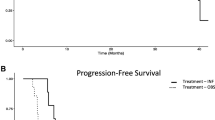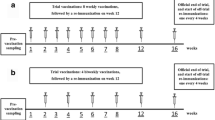Abstract
Background: Case control studies have demonstrated that administration of CancerVax, a polyvalent melanoma cell vaccine (PMCV), after complete resection of melanoma metastases produces a significant improvement in disease-free survival (DFS). Because PMCV has no direct cytotoxic effect on melanoma cells, the authors hypothesized that it prolongs survival by enhancing antibody-mediated antimelanoma cytotoxicity.
Methods: One hundred melanoma patients participating in a trial of PMCV adjuvant therapy following complete resection of regional node metastases were randomly selected for study. Serum samples obtained immediately before (T0) and 4, 8, 12, and 16 weeks after initiation of PMCV adjuvant therapy were adsorbed with L-14 lymphoblastoid cells and then tested for in vitro complement-dependent cytotoxicity (CDC) against M-14 cells, a melanoma cell line not used in PMCV. CDC was expressed as percentage of total cells (n=10,000) killed. Survival curves were estimated by the Kaplan-Meier method. Statistical analysis was performed by the signed rank sum test, Spearman test, log-rank test, and Cox proportional hazard regression.
Results: Median CDC at T0 was 4.5% (range, 0% to 40%). Within 16 weeks after initiation of PMCV therapy, CDC had increased in 82 (82%) patients. The median increase of 7.5% (range, −9% to 39%) represented a highly significant change (signed rank sum test;P=.0001). At a median follow-up of 29 months (range, 6 to 92 months), the maximum increase in CDC (ΔCDC) as a continuous variable was significantly correlated with DFS (P=.0001). Median survival and 5-year DFS were more than 54 months and less than 54%, respectively, for patients with ΔCDC≥10% (n=44) but only 7 months and 14%, respectively, for those with ΔCDC<10% (n=56;P=.0001). Multivariate analysis confirmed ΔCDC as the most significant independent variable associated with DFS following initiation of PMCV therapy (P=.0001).
Conclusion: PMCV therapy greatly enhances serum CDC against melanoma cells. This enhancement is directly correlated with DFS following initiation of vaccine therapy.
Similar content being viewed by others
References
Morton DL, Barth A. Vaccine therapy for malignant melanoma.CA Cancer J Clin 1996;46:225–44.
Rosenberg SA, Lotze MT, Muul LM, et al. Observations on the systemic administration of autologous lymphokine-activated killer cells and recombinant interleukin-2 to patients with metastatic melanoma.N Engl J Med 1985;313:1485–92.
Dorval T, Palangie T, Jouve M, et al. Clinical phase II trial of recombinant DNA interferon (interferon alpha-2b) in patients with metastatic melanoma.Cancer 1986;58:215–8.
Legha SS, Papadopoulos NE, Plager C, Ring S, Chawla SP, Evans LM, Benjamin RS. Clinical evaluation of recombinant interferon alpha-2b (Roferon-A) in metastatic melanoma using two different schedules.J Clin Oncol 1987;5:1240–6.
Robinson WA, Mughal TI, Thomas MR, Johnson M, Spiegel RJ. Treatment of metastatic malignant melanoma with recombinant interferon alpha-2.Immunobiology 1986;172:275–82.
Parkinson DR, Abrams JS, Wiernik PH, et al. Interleukin-2 therapy in patients with metastatic malignant melanoma: a phase II study.J Clin Oncol 1990;8:1650–6.
Rosenberg SA, Packard BS, Aebersold PM, et al. Use of tumor-infiltrating lymphocytes and interleukin-2 in the immunotherapy of patients with metastatic melanoma. A preliminary report.N Engl J Med 1988;319:1676–80.
Dutcher JP, Creekmore S, Weiss GR, et al. A phase II study of interleukin-2 and lymphokin-activated killer cells in patients with metastatic malignant melanoma.J Clin Oncol 1989;7:477–85.
Ferrone S. Human tumor-associated antigen mimicry by anti-idiotypic antibodies: immunogenicity and clinical trials in patients with solid tumors.Ann NY Acad Sci 1993;690:214–24.
Berd D, Maguire HC Jr, Mastrangelo MJ. Treatment of human melanoma with a hapten-modified autologous vaccine.Ann NY Acad Sci 1993;690:147–52.
Mitchell MS, Harel W, Kan-Mitchell J, et al. Active specific immunotherapy of melanoma with allogeneic cell lysates. Rationale, results, and possible mechanisms of action.Ann NY Acad Sci 1993;690:153–66.
Nabel GJ, Gordon D, Bishop DK, et al. Immune response in human melanoma after transfer of an allogeneic class I major histocompatibility complex gene with DNA-liposome complexes.Proc Natl Acad Sci USA 1996;93:15388–93.
Morton DL, Foshag LJ, Hoon DSB, et al. Prolongation of survival in metastatic melanoma after active specific immunotherapy with a new polyvalent melanoma vaccine.Ann Surg 1992;216:463–82.
Jones RC, Kelley M, Gupta RK, et al. Immune response to polyvalent melanoma cell vaccine in AJCC stage III melanoma: an immunologic survival model.Ann Surg Oncol 1996;3:437–45.
Hsueh EC, Gupta RK, Qi K, Morton DL. Correlation of specific immune responses with survival in patients receiving polyvalent melanoma cell vaccine.J Clin Oncol 1998;16:2913–20.
Ravindranath MH, Hsueh E, Jones RC, Morton DL. Anti-GD3 IgM antibody induced by polyvalent melanoma cell vaccine (PMCV) is significantly correlated with survival of patients with regional metastatic melanoma.Proc Am Assoc Cancer Res 1998;38:2516.
Renk CM, Gupta RK, Irie RF, Morton DL. Comparison of the techniques used for monitoring humoral immunity in cancer patients.J Surg Oncol 1982;19:155–61.
Pellegrino MA, Ferrone S, Reisfeld RA, Irie RF, Golub SH. Expression of histocompatibility (HLA) antigens on tumor cells and normal cells from patients with melanoma.Cancer 1977;40:36–41.
Lewis MG, Ikonopisov RL, Nairn RC, Phillips TM, Fairley GH, Bodenham DC, Alexander P. Tumour-specific antibodies in human malignant melanoma and their relationship to the extent of the disease.Br Med J 1969;3:547–52.
Bodurtha AJ, Chee DO, Laucius JF, Mastrangelo MJ, Prehn RT. Clinical and immunological significance of human melanoma cytotoxic antibody.Cancer Res 1975;35:189–93.
Canevari S, Fossati G, Della Porta G, Balzarini GP. Humoral cytotoxicity in melanoma patients and its correlation with the extent and course of the disease.Int J Cancer 1975;16:722–9.
Ferrone S, Pellegrino MA. Cytotoxic antibodies to cultured melanoma cells in the sera of melanoma patients.J Natl Cancer Inst 1977;58:1201–4.
Irie RF, Irie K, Morton DL. A membrane antigen common to human cancer and fetal brain tissues.Cancer Res 1976;36:3510–7.
Author information
Authors and Affiliations
Rights and permissions
About this article
Cite this article
Hsueh, E.C., Famatiga, E., Gupta, R.K. et al. Enhancement of complement-dependent cytotoxicity by polyvalent melanoma cell vaccine (CancerVax): Correlation with survival. Annals of Surgical Oncology 5, 595–602 (1998). https://doi.org/10.1007/BF02303828
Received:
Accepted:
Issue Date:
DOI: https://doi.org/10.1007/BF02303828




